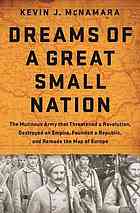
Dreams of a Great Small Nation
The Mutinous Army that Threatened a Revolution, Destroyed an Empire, Founded a Republic, and Remade the Map of Europe
کتاب های مرتبط
- اطلاعات
- نقد و بررسی
- دیدگاه کاربران
نقد و بررسی

Starred review from March 14, 2016
In this captivating narrative history, foreign policy scholar McNamara reveals the obscure yet grand story of how a small, motley, and hastily organized army ushered in the founding of the nation of Czechoslovakia. The Czech and Slovak ethnic groups had for centuries been second-class subjects of the Austro-Hungarian Empire, enduring harsh oppression within the expansive and divided domains of the anachronistic monarchical regime. The upheaval of WWI provided opportunities to act on long-held nationalist yearnings. Tomáš Masaryk (1850â1937), a resolute philosophy professor and protagonist in this story (aided by Edvard BeneÅ¡ and Milan Rastislav Å tefánik), embarked on an ambitious effort to organize a Czech-Slovak army from POW camps in Russia, aiming to support the Allied war effort in return for support for a postwar independent state. Masaryk successfully united Czechs and Slovaks abroad, cultivated international support, raised funds, and recruited military volunteers, while the Czech-Slovak forcesâdespite plenty of difficulties, particularly amid revolutionary tumult in Russiaâwon a long series of victories that galvanized their struggle. McNamara proves to be a great storyteller as he very effectively weaves together newly translated firsthand accounts of Czech-Slovak soldiers with secondary historical sources. Maps.

Starred review from February 1, 2016
The first English-language account of a small army that actually took control of Siberia in 1918. While developing his story, McNamara, an associate scholar at the Foreign Policy Research Institute and associate dean at Drexel University, explains the birth of the Czecho-Slovak nation and the tireless work of three exiles: Toma] Masaryk, Edvard Bene], and Milan ]tefanik. The first--and most important--point the author makes is that, while sharing a similar language and the oppression of the Austria-Hungarian Empire, the Slovaks of Hungary and the Czechs of Austria were never one people, as evidenced by their split in 1993. In fervent hopes that the war would take long enough to cause the collapse of the Habsburg Empire, Masaryk traveled all over Europe seeking support for the establishment of a new country. His decision to go to Russia to organize a druina of Czecho-Slovak troops created the army that would ensure the birth of the country, Czechoslovakia, that would call him president. Originally only about 350 former prisoners of war, the army eventually grew to a well-disciplined, cohesive group of more than 200,000. The story is extraordinary, and McNamara follows the frustrations of the men who became foils for the Russians, the Germans, and the Allies. Originally scheduled for transport on the Trans-Siberian Railway to Vladivostok for transfer to ships and passage to the Western front, the Russians wanted them in Murmansk while the Allies needed them to establish a second front in the war. McNamara, an impressive storyteller armed with a treasure of documents only recently available, ably narrates the remarkable feats of these men who fought every inch of the way, "who found themselves described in some quarters as the first counterrevolutionaries of a new ear." Though newspapers across the globe followed the trek, actual assistance was in short supply. A fantastic addition to the shelves of World War I histories.
COPYRIGHT(2016) Kirkus Reviews, ALL RIGHTS RESERVED.

March 15, 2016
McNamara (associate scholar, Foreign Policy Research Inst.) shares a valuable story that is relatively unknown and understood in the West. Through careful translation of primary Czecho-Slovakian documents, the author chronicles the Czecho-Slovakian legion, its military history in Russia in the late 1910s, and its political leader Tomas Masaryk; all of which led to the creation of the Czecho-Slovakian nation as a result of the upheaval surrounding the events of World War I. McNamara's journalistic background is evident in terms of his pacing and the various structuring devices he uses, creating a narrative that reads more like a series of articles than a history text. The overwhelming amount of source content occasionally contributes to a muddled narrative as the plethora of compelling stories can detract from the clarity of each perspective. VERDICT Despite these issues, McNamara's work presents a vital first entry that opens the doors on this integral part of World War I history and the shaping of the Soviet-influenced Eastern European political and social fabric.--Elizabeth Zeitz, Otterbein Univ. Lib., Westerville, OH
Copyright 2016 Library Journal, LLC Used with permission.

























دیدگاه کاربران